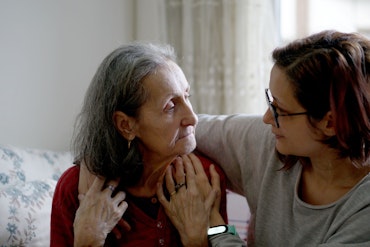Survey shows aged care residents could be at risk
The health and wellbeing of older Australians living in residential aged care could soon be at risk, following the release of a new survey report that shows more than one in three doctors plan to cut or stop visits over the next two years.

Doctor visits to aged care facilities over the coming years could be drastically reduced or stop all together, according to a new survey (Source: Shutterstock)
Conducted by the Australian Medical Association (AMA), the 2017 AMA Aged Care Survey, which included the voices of over 600 GPs, consultant physicians, palliative care and geriatrician specialists, revealed the potential cutbacks to services within residential aged care when it was released last week.
The survey, which is the fourth of its kind, shows the cutbacks would come from the more than 35 percent of participating doctors who report that they plan to refuse new patients and reduce the number of visits, or stop completely, over the next two years, as a result of a reported lack of suitably trained and experienced nurses, and inadequate Medicare patient rebates.
Doctors surveyed also say they are concerned about the trend to replace registered and enrolled nurses with personal care attendants who they say are not appropriately trained to deal with the health issues older people face.
The AMA’s Dr Tony Bartone says the survey raised worrying concerns about the issues involved in providing medical care to older Australians.
“We are making this report public because now, more than ever, we need action in aged care,” he says.
“Australia is facing an ageing population, with more chronic, complex medical conditions than ever.
“The aged care workforce does not have the capability, capacity and connectedness to adequately meet the needs of older people.
“People living in residential aged care facilities must have timely access to medical practitioners to avoid adverse health events, unnecessary hospitalisations and associated costs to the health system.”
Dr Bartone adds that the AMA members surveyed say having sufficient numbers of experienced nurses available was their “top priority”, with almost 66 percent rating it as urgent or extremely urgent.
“Almost 85 percent said that a nurse, with most specifying a registered nurse, is the level of expertise required to conduct a professionally responsible handover for their patient’s care,” he explains.
“Many doctors reported that there is sometimes no nurse available for doctors to carry out a clinical handover and no nurse available to administer medicines after hours.
“This poses serious risks to the health of patients living in residential aged care facilities.”
ANMF Federal Secretary Annie Butler says the national organisation is “not entirely surprised” to hear the survey results.
“It is interesting for us, because over the last couple of years, this has become the biggest issue for these doctors,” Ms Butler says.
“There have been a number of issues that have been barriers to doctors, and a shortage of nurses is one, but now it is their number one demand.
“Unfortunately because of our members across the country, we are not surprised by the survey because it’s what our members have been telling us.
“These responses solidify our concerns and demands when supported by an organisation like the AMA – we need to have the right balance of quality nurses and carers on staff.”
The AMA’s Dr Bartone says the survey also found that doctors rate being adequately compensated for time away from their surgery as urgent or extremely urgent.
“More than four in five doctors who had decreased their visits to residential aged care facilities over the past five years said increasing, unpaid non-contact time was the reason for their decision,” Dr Bartone says.
“Fewer than 10 percent of respondents said that the Medicare Benefits Schedule (MBS) rebate for visiting patients in residential aged care facilities was adequate to compensate for non-contact time, including locating the patient, filling in scripts and paperwork, talking to relatives, renewing scripts over the telephone, and telephone calls to staff while in their surgery.”
Dr Bartone adds that the end of the GP Aged Care Access Incentive (ACAI) payment, which is coming up in April next year, may see even more GPs abandon visiting residential aged care facilities.
He says the AMA has communicated all the concerns raised directly to the Aged Care Workforce Strategy Taskforce, which was due to report to the Federal Minister for Aged Care, Ken Wyatt, on 30 June.
“Adequate funding must be provided to ensure that Australia’s ageing population has access to quality medical care through a quality aged care workforce,” he says.
“This must be an urgent priority.”























